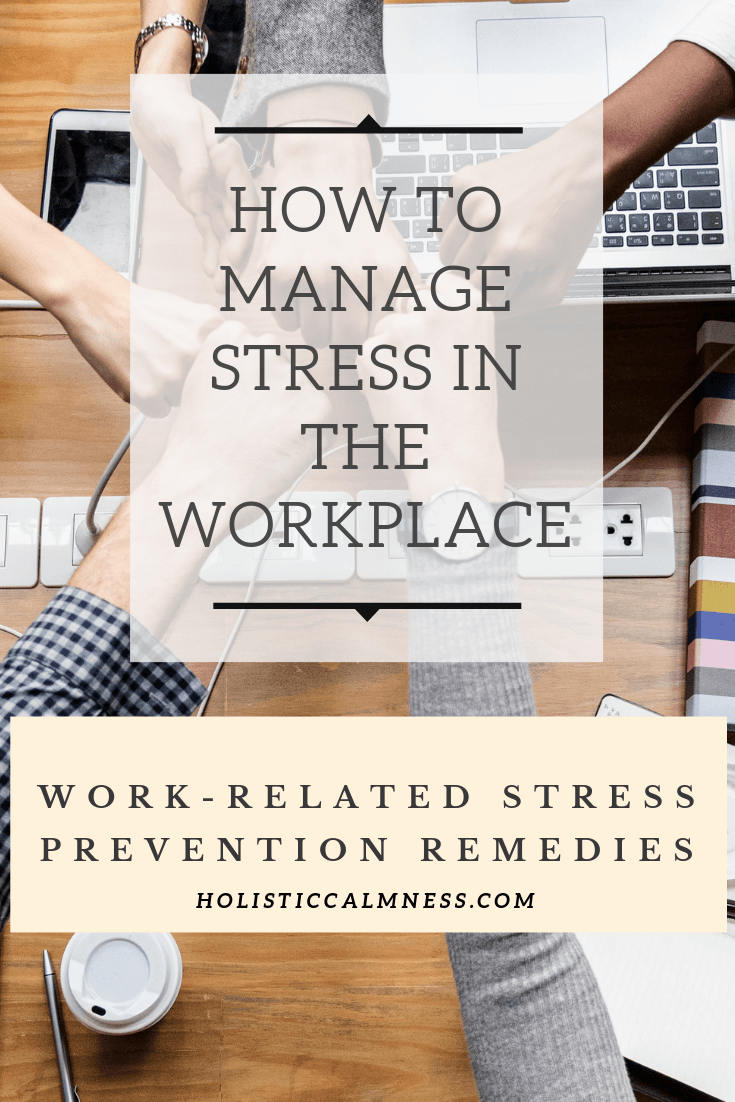How to Manage Stress in the WorkPlace
For the very first time, the World Health Organization has acknowledged that workplace stress has scaled to near-epidemic levels. And that we, workers can no longer cope. Which takes me back to my former workplace.
Now, before I started working for my current employer, I was attached to one of the Global tech giants – let’s call it company X, as a Store Associate.
The salaries were colossal and we enjoyed some handsome perks to boot.
But barely a few months would pass before hearing of another resignation. It actually reached a point where the hiring people were among the busiest…replacing ‘fallen’ staff.
I say fallen because the monthly targets were insane.
In the meantime, the bosses were always over you with each missed target. Of course, I wasn’t superwomen and I left less than 2 years into the job. Now, the behavior of the bosses at company X typically represents what happens in nearly all contemporary workplaces. And it’s harming us- in a big way as you will see next.
How workplace stress harms your well-being
Like I said, stress in your workplace is like cancer- it eats you slowly and you eventually perish. Here is how it effects you..
- Develop serious health conditions– when stressed, your body automatically attempts to respond by elevating your blood pressure, respiration, metabolism, heart rate, and sending more blood to your muscles. However, when this is done repetitively and constantly, it raises your risk of suffering chronic illnesses like heart disease.
- Depression– when again the stressful scenarios keep repeating themselves, your mind may develop unending anxiety leading to long-term depression.
- Addiction issues– in an attempt to create an escape, some of us turn to smoking and alcohol and become their slaves. As you might be aware, drug addiction can make you miserable and lead to drastic consequences including family separation.
And you know what? The same workplace stress can lead to you losing your job. Reasons?
- You will increasingly feel drained or exhausted which means diminished performances and professional efficacy.
- You might start hating your job and turn into a notorious absentee often with flimsy reasons. Your seniors will ultimately get fed up and advertise your position.
- Because of negativism towards your job, you may become highly irritable and hence a pain to your colleagues. You will be on your way out as soon as the leaders get tired of your violent antics.
In short, stress at your workplace is a sad, sad eventuality.
Which begs the question, is all stress bad? And is it practical to expect to live stress-free?
Well, the answer to both questions is a big NO!
Let’s first talk about good stress.

We all need good stress
Let’s face it: Many workers, I included, cannot perform without being pushed- I think its human nature…
And so we all need a bit of stress…or what psychologists call good stress or eustress.
Now, the keyword for this kind of stress is that it brings positive results.
You know, it makes you excited to achieve your ambition and goals without inducing fear or being threatening.
To me, this is the fuel towards my biggest dreams and life goals so I embrace it- I am sure you also do.
In other words, it’s not very healthy to live without some stress neither is it practical to expect such living at home, school or work.
When does good stress transit to bad workplace stress?
Our well being takes a turn for the worse when our work demands push us to the edge and exceed acceptable stress levels (for good stress). This can result from the following:
- You’re assigned new responsibilities that don’t match your knowledge and abilities.
- Your bosses and team members accord you little support despite the demanding nature of your tasks.
- You have no say over your work processes.
- You are allocated a rude and unethical manager.
- Your job has grown monotonous.
- You are always faced by too much workload and have to work prolonged hours.
- You work under rigid deadlines.
- The organization has implemented unfair job evaluation systems.
- Lack of work-life balance.
- Lack of job clarity.
- You work under fear of being laid off.
- Being bullied at work.
- You’re perpetually given hazy job instructions.
- Some of your colleagues are constantly undermining you
And so forth.
The worst bit is that some of us don’t even know we are stressed.
Yet, you cannot pursue coping measures if you’re not aware of your workplace stress.
This begs the question: how do you tell that you’re suffering from work-related stress?
Read on to find out.
Work stress symptoms
Here now are some of the telltale signs that you’re succumbing to workplace-related stress.
- You’re forever anxious
- You lose interest in work.
- Petty issues quickly annoy you.
- Problematic sleep pattern.
- Excessive fatigue.
- You no longer concentrate.
- Incessant headaches.
- Unexplained stomach problems (for example, diarrhea and constipation).
- You find joy in withdrawing from colleagues.
- Reduced sex drive
- Skin disorders.
- Mindless eating.
- Reduced appetite levels.
- Diminished hope and more pessimism.
- Crazy mood swings.
- Feelings overwhelmed and helpless.
- You cherish out-of-work days like weekends
- Decreased creativity.
- Poor memory.

How to react or respond better when stressed out at work
Admittedly, it’s not easy to overcome workplace and it can sometimes take you months (even longer) to restore your usual self.
Nevertheless, you risk the previously mentioned terrible outcomes if you don’t react responsibly to your workplace originated stress.
What am I driving at?
Well, simple. You cannot recover from stress if:
- You don’t admit that you’re troubled (and instead bury your head in sand).
- You don’t take charge of your destiny by enacting coping mechanisms.
The thing is we have already looked at the warning signs and you can by now easily tell when stressed.
And so will concentrate on the second part- how to alleviate (and prevent) stress, which requires that you identify and apply fitting coping plans.
How to prevent workplace stress
I will first introduce you to some of the simplest strategies to help you avoid stress at your workplace (remember the tired adage about prevention being better than cure?).
Work-related stress prevention remedies
To avoid stressful situations, you should modify your work practices as follows:
1. Adopt better work planning for success
Many of us are guilty of approaching our days in a gung-ho manner despite being aware of the importance of having goal-oriented work programs.
To understand, take a look at the forthright equation below:
A planned day + COMMITMENT = desired results
Question is how do you practice this?
Well, to reduce your stress, start by changing the way you start your days.
Studies like this have repeatedly shown that those who set SMART goals are more likely to be successful in life, work, education, and elsewhere.
I would, therefore, recommend that you commence by breaking up your upcoming project into small daily tasks/goals.
You then, of course, make sure that you meet daily goals.
You will undoubtedly arrive at your desired results and on time.
You will undoubtedly arrive at your desired results and on time.
2. Eliminate interruptions
Often, due to being surrounded by the ever-evolving tech, we are tempted to repetitively check our devices for emails, social media tags, and tweets every time an alert pops up.
That’s unwise because it messes your concentration besides wasting your precious hours- research shows that on average you could be losing as much as 5 hours to social media every week!
And I am not in any way saying tech is bad- far from that.
However, you need to reduce its disruptive presence by, for example, setting aside some minutes purposely to attend to your communications.
You then keep it aside until your next tech break.
You might also lock the office door sometimes –for instance, when working on mentally-involving tasks.
This boosts focus and helps you attain your set goals.
3. Be realistic
Time and again, we are our own worst enemies.
For example, you’re risking disappointment and thus stress by attempting to be a perfectionist.
Friend, it doesn’t work that way.
Okay, I agree that it’s always good to lay down a marker (it can land you a surprise promotion and all that) but it shouldn’t be at the cost of stretching yourself.
According to research, perfectionism is in fact a major risk factor for depression and anxiety not only at work but also at home.
Accordingly, you should try to be realistic by providing room for errors in your daily performance.
How to find relief from workplace stress
When stress happens, you should avoid the temptation to berate yourself as a weakling and instead turn your attention to healing.
Here are some helpful proposals for you to try out:
1. Switch to stress relief foods
Believe it or not, your dieting habits can amplify your stress or offer reprieve to your stressed soul.
As you might be aware, coffee is bad as are fatty foods and sugary snacks in addition to alcohol.
In contrast, studies have suggested that eating diets rich in vegetables, whole grains, fruits, lean protein, nuts, and seeds can be beneficial.
Also, add to your new dieting routine foods such as:
- Prebiotics– This help gut bacterial balance and are found in foods like asparagus, garlic, onion, legumes, and artichoke
- Magnesium-rich foods– Magnesium reinvigorate your body and is aplenty in seafood and raw cacao.
- Some of the aforementioned veggies and fruits are also magnesium packed.
- Herbal tea– This introduces welcome calming characteristics for better sleep and easing of anxiety. For many people, green tea and passionflower tea are superb options.
- Omega-3 fatty acids- These beat mood swings and you will find them in seaweed, flaxseed, and fatty fish (including salmon, herring, and sardines).

2. Practice Stress-relieving mediation
Meditation is simple to learn but immensely helpful with workplace stress.
During meditation exercises, you switch your attention from depressing routines and consequently clear up your mind.
This can bring an improved physical as well as emotional condition.
Even if you’re to commence by performing simple breathing exercises, just go for it. You can perhaps consider advanced meditation techniques like Yoga later.
3. Indulge in Essential Oils
Aromatherapy was popular among our forefathers because of its relaxation and calming effect. You can also exploit it.
You will be inhaling and applying helpful essential oils such as lavender, chamomile, rosemary, and more.
This might also help you defeat insomnia and related workplace-triggered issues.
General Self-help measures to cope with Stress in the Workplace
As I highlighted earlier on, winning the battle against workplace stress isn’t a walk in the park and you may have to go out of your way sometimes.
Here is how else you can help salvage the situation even as you execute the previous advice:
- Speak out: This works like a charm. Book an appointment with your bosses and discuss your predicament. And shoot straight… ‘Boss, you’re killing me with work!’ while asking for practical solutions or provide your own.
- Also talk to your inner circle, your partner, and anybody else who can offer a listening ear.
- Seek a helping hand: If the worst comes to the worst, seek help from your workplace counselor or a psychologist.
- Effect work-life balance: Avoid the temptation to carry work home in favor of spending quality with your lover and kids. Also, create time for socialization and holidays.
- Look for something to celebrate: Amid the gloom and doom, there exists a shining light. It could be you’re almost completing your second degree despite work pressure or you have a brilliant family…Whatever it is, just look for something to celebrate and keep you motivated.
- Ask for a transfer: Sometimes the environment can be overwhelmingly toxic that everything else fails. Don’t be afraid to apply for a transfer (or completely quit if that’s what it takes), and plan to find a better workplace that can relieve the stress. It could prove a masterstroke decision in the long run, as far as your psychological and physical health is concerned.
In summary
Workplace stress is a growing crisis and as much as organizations are trying to help by deploying better working environments, a lot boils down to your conduct and reaction to circumstances.
You should try to keep off pitfalls like volatile and negative colleagues and becoming better organized through proper goal setting and prioritizing.
But such actions may not always prevent stress so you also need to enact coping mechanisms such as meditation, exercise, and proper dieting if a victim.
Other helpful measures include expressing your frustrations to your bosses and team members.
You can also vent on the members of your inner circle who can also offer a shoulder to cry on. Also, don’t forget to seek professional help if your situation is absolutely desperate.
Truth be told, none of the tactics is easy but with sufficient determination, you should be fine- which is what matters.









